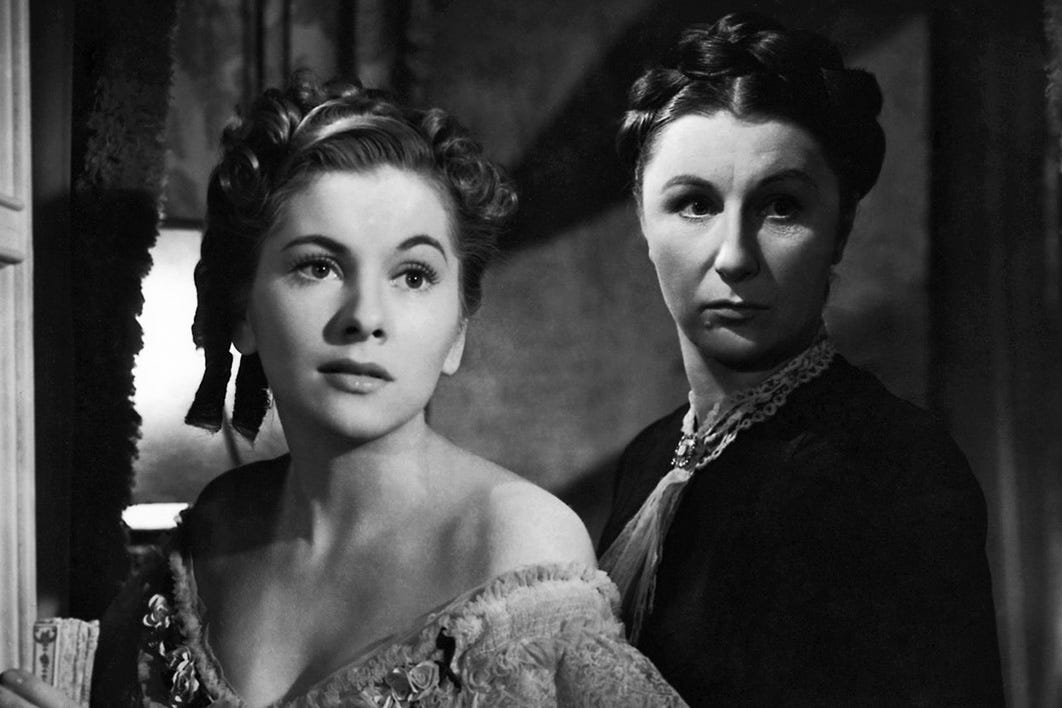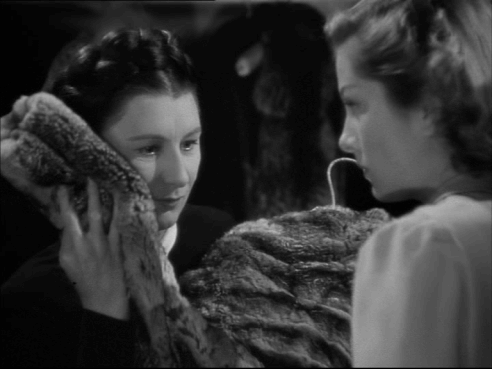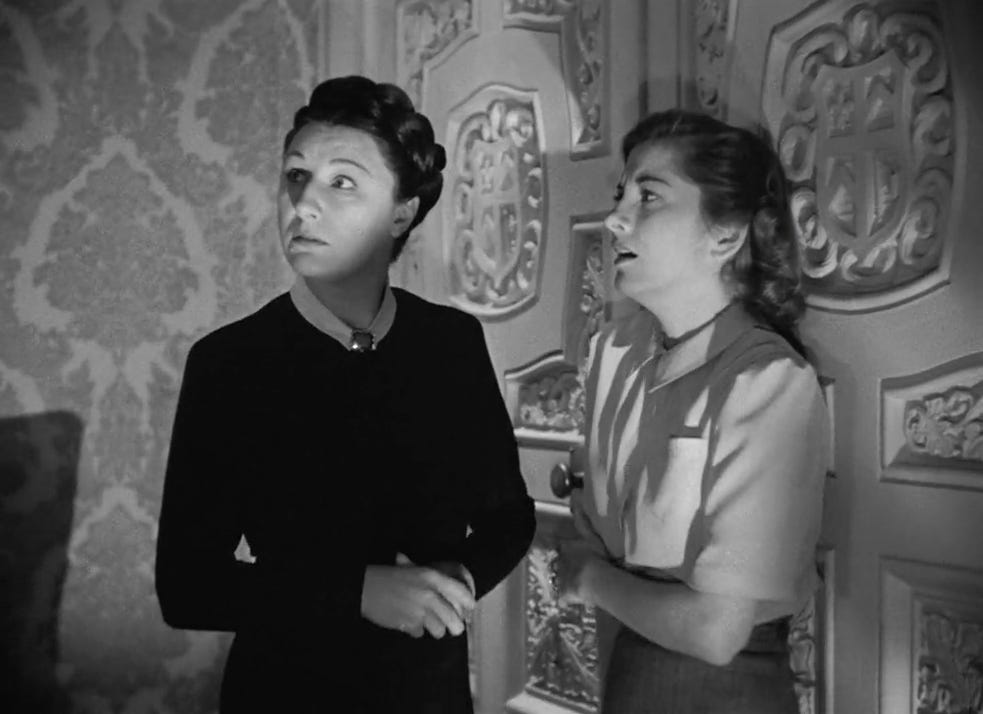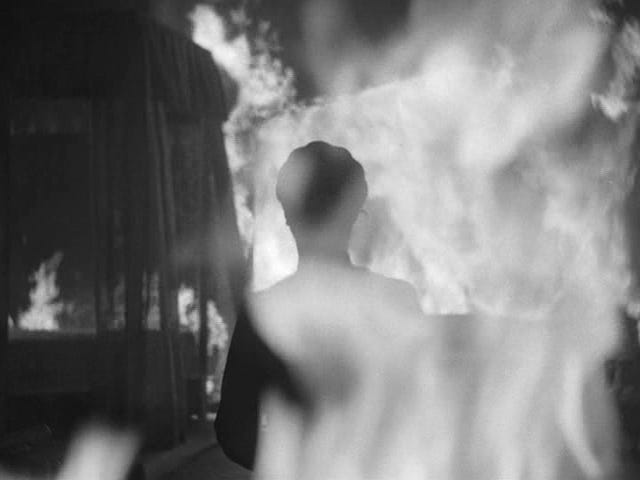Paging Dr. Lesbian - A Lesbian Ghosting
This is the Sunday Edition of Paging Dr. Lesbian. If you like this type of thing, subscribe, and share it with your friends. A paid subscription gets you more writing (like this) from me and will help me keep this newsletter afloat. Consider going paid! David Foster Wallace once wrote that “every love story is a ghost story.” Such a pronouncement is distinctly applicable to gothic romance, especially in its most queer under(over)tones. Gothic romance, after all, is characterized by its foreboding atmosphere and the uncanny figures that haunt its setting. Love, in this context, is almost always haunted by something or another. There is something particularly lesbian (if that can be used as an adjective, which I believe it can) about ghosts and hauntings. Ilana Eloit and Clare Hemmings, the editors of a special issue of Feminist Studies entitled Haunting Feminism: Encounters with Lesbian Ghosts, have much to say about the productive symbolism of such figures. They write: “Considering lesbianism as a ghost who has haunted modern Western (feminist) history rather than as a fixed sovereign subject, we wanted to conceive of the lesbian as that which can never be contained, as that which is likely to surprise and frighten us.” They go on to argue that the lesbian (ghost) “reveals the unnaturalness” of the dominant social order, which is why she’s such a valuable figure. The lesbian ghost is especially well-suited to haunt the halls of gothic romance, a genre with richly gendered implications. Diana Wallace argues that “The Female Gothic” is the perfect venue to explore “fears about women’s powerlessness and imprisonment within patriarchy,” referencing Luce Irigaray’s concept of déréliction, meaning women’s “abandonment outside the symbolic order.” Wallace goes on, arguing that “this state of déréliction renders women ghost-like: they are ‘nowhere . . . never in touch with each other, lost in the air like ghosts.” The idea of déréliction is especially applicable to the lesbian who exists doubly outside of the social order, often facing both exclusion and invisibility – two circumstances that might turn someone into a ghost. A haunting, then, is almost inevitable. Considering all of this, it shouldn’t come as a surprise that Alfred Hitchcock’s Rebecca, a gothic romance and the only film for which he won an Oscar, would be so lesbian in both theme and text. Based on the novel by Daphne du Maurier –a noted lover of women – Rebecca is one of Hitchcock's masterpieces. The story goes like this: a young, unnamed woman (the magnificent Joan Fontaine) meets Maxim De Winter (Laurence Olivier), a charming but mysterious widow who she quickly marries. Maxim takes the new Mrs. De Winter to the intimidating family estate – Manderley – where she finds herself unable to cope with the spectral presence of his first wife, Rebecca, who died under mysterious circumstances. The second Mrs. De Winter also butts heads with Rebecca’s loyal housekeeper, Mrs. Danvers (Judith Anderson), who remains fixated on the former lady of the house. Rebecca is never seen or heard, yet her presence is undeniable. As a film, Rebecca is both masterfully subtle and exceedingly overt in its construction of moral concepts. There are two themes in Rebecca that stand out as being particularly significant. To put it simply, Rebecca is a film about queer ghosts and lesbian hauntings, and it's also about the destructive denial of grief. Mrs. Danvers, the character who has most clearly lost something with the death of Rebecca, is a central figure in this supernatural wreckage. Mrs. Danvers has long been read by many viewers as lesbian or queer. Affectionately known as Danny by Rebecca herself, Mrs. Danvers is clearly haunted by her former employer, and her loyalty is unshakable. She is immediately hostile towards the new Mrs. De Winter, constantly needling her and reminding her of the beauty Rebecca once bestowed upon Manderley. At one point she even urges the new Mrs. De Winter to kill herself because she will never measure up to her predecessor, illustrating the terrifying depth of her allegiance. The most evocative, even shocking scene in the film comes about halfway through, when Mrs. Danvers finds the second Mrs. De Winter snooping in Rebecca’s old bedroom (which has been kept just as she left it.) Mrs. Danvers begins reverently touching all of Rebecca’s things, describing Rebecca’s bedtime routine and how Mrs. Danvers relished every moment of it. Mrs. Danvers opens the closet, stroking Rebecca’s fine clothes, and even opens her underwear drawer, marveling at how silky and thin her lingerie is. It’s almost impossible to read this scene through any other lens but queer desire, and it is precisely this desire and vicious devotion that disturbs the second Mrs. De Winter so greatly. If you’re a fan of queer cinema – broadly defined – a scene like this might feel familiar to you. Queerness has always existed as a specter throughout cinema history, and gay ghosts frequently populate our screens. Think, for example, of The Power of the Dog, in which the unseen paramour of Phil, Bronco Henry, looms large over the entire film despite his invisibility. Bronco Henry can only exist as a ghost, as Phil’s queer desire – and indeed, his grief – is forever deferred. Or we might consider Tom Ford’s A Single Man, which deals explicitly with the ungrievabilty of queer loss. (Speaking of queer loss, the scene where Mrs. Danvers touches Rebecca’s fur coat also recalls a devastating scene near the end of Brokeback Mountain.) All of these examples depict gay or queer men, of course, as the lesbian ekes out her own place in the cinematic canon. The lesbian is a threatening figure, which is why Mrs. Danvers is so clearly situated as the villain of the story. Rhona J. Berenstein writes that “Portraying lesbians as ghosts in Hollywood movies is, then, directly linked to cultural attitudes and anxieties about homosexuality. The lesbian is a paradoxical figure; she is an invisible–yet representational–threat.” While Rebecca herself may not be overtly queer coded, she creates a sort of queer psychosis in those she haunts, especially Mrs. Danvers. She thus represents queer desire. Whether or not Rebecca ever returned Mrs. Danver’s affections is beside the point – she exists only as a ghost, cemented in rose-colored memories (or shadowy, black and white memories, as it were), forever. But Maxim describes Rebecca as a very queer woman indeed, indicating that perhaps she has more in common with her devoted housekeeper than we might have initially guessed. In the film, Maxim describes how much he hated Rebecca, noting that she was “incapable” of love. The book goes even further, as Maxim claims that “she was not even normal.” We can even read Maxim’s recollection of the moment when Rebecca “told me all about herself” as a coming-out of sorts, as disgusted as Maxim was by her gleeful confession. (Would a confession of heterosexual infidelity really induce such disgust, such horror?) The second Mrs. De Winter – who early on in the film describes herself as “not the sort of person men marry” – is also affected by Rebecca’s ghostly (and lesbian) presence, try as she might to resist. The second Mrs. De Winter is clearly implicated in Mrs. Danver’s queer reminiscing, as Mrs. Danvers forces her to stroke Rebecca’s fur coat alongside her. Berenstein even suggests that there is also some sort of queer desire between Rebecca and the second Mrs. De Winter, despite the fact that the two have never met (in any corporeal way, at least.) Lesbian ghosts might just be the most peripheral, most haunting kind of ghosts, relegated as they are to non-existence. But, at the same time, this also makes them powerful, as the effort it takes to disappear something so transgressive only highlights its importance. In the end, no one can rid themselves of Rebecca, no matter how hard they try. Even the second Mrs. De Winter, as terrified as she is of Rebecca, longs to go back to Manderley, as she notes in the opening and closing voiceovers in the film. Mrs. Danvers is transformed and transfixed by her longing for Rebecca, and her abiding attachment advances much of the film’s narrative. Danny is trapped in ungrievable grief, grief which has very violent consequences. What Mrs. Danvers is experiencing is a striking example of melancholia, a psychological state first described by Freud. In “Melancholy Gender – Refused Identification,” Judith Butler discusses Freud’s understanding of grief. Freud “assumed that grief could be resolved through a decathexis, a breaking of attachment, as well as the subsequent making of new attachments,” Butler writes. When this process is denied or deferred, the individual in question exists in a state of melancholia, something Freud saw as a regressive or paralytic state. Butler takes Freud’s identification of melancholia one step further, suggesting that it can develop social and political implications as well. “Where there is no public recognition or discourse through which such a loss might be named and mourned, then melancholia takes on cultural dimensions of contemporary consequence,” they write. Butler argues that the heterosexual subject is founded on the disavowal of queer grief and queer attachment, what they call a “never-never” of refusal. Not only is Mrs. Danvers unable to undergo this process of decathexis that Freud spoke of, but her grief is also not legible to those around her. In Precarious Life, Butler suggests that there is a “hierarchy of grief” that delineates which lives are grievable and which are not. Rebecca’s noted difference and Mrs. Danvers' “unnatural” attachment to her means that this loss cannot really be constituted as a loss at all, meaning it is not intelligible within the dominant social structure. There are ways in which grief and loss can be a productively equalizing and connective force. Butler suggests that the universality of grief – in other words, “precarity” – can be politically and socially transformative in that it reveals how connected we all are to each other, how we are quite literally constituted by the ties we have to our communities and loved ones. José Esteban Muñoz wrote about his belief that we need to de-pathologize melancholia so that it can become a transgressive political and cultural force, one that recognizes loss while moving towards the future. For the residents of Manderley, there is no such community. The precarity of the characters in Rebecca does not create a leveling sense of connectedness, but rather illustrates the loneliness of queer desire and grief and its incomprehensibility within the social order. Mrs. Danvers’ grief is transformative, but not in the way Muñoz imagined. Her visible queer attachment disrupts the matrix of heterosexuality, yet she also remains trapped in her own vortex of melancholia. There is nowhere for her grief to go except toward the new Mrs. De Winter, who (mostly) evades her smothering affection. It’s a stultifying, corrosive melancholia, the product of mourning deferred. Mrs. Danvers may be the flesh-and-blood villain of the story, but her descent into madness isn’t all that remarkable. Without space to grieve, Mrs. Danvers remains in a perpetual state of melancholia, turning Manderley into a crypt of her own making. Rebecca’s ghosting has a ripple effect, and since she cannot be properly mourned by those still living, her spirit haunts Manderley, forging a lesbian combatant in the form of her loyal servant. This is what is so horrific and indeed, so haunting, about a film like Rebecca. For loss can (and will) be visited upon us all, and without the opportunity to grieve, we may very well go up in flames. You’re a free subscriber to Paging Dr. Lesbian. For the full experience, which includes weekly dispatches from the lesbian internet, become a paying subscriber. Your support means a lot! |
Older messages
[Guest Column] "Not Assuming Your Sexuality Right Off the Bat is the Very Least People Can Do"
Sunday, July 31, 2022
What Heteronormative Health Professionals Need to Learn
Saving Gentleman Jack
Sunday, July 24, 2022
How Anne Lister and Ann Walker have touched fans from around the world, and why they think the show deserves to live on
Lesbian Film Spotlight: Mafia Lesbians In ‘Alto’
Sunday, July 17, 2022
In Which I Watch Another Bad Lesbian Movie So You Don't Have To
Sign in to Paging Dr. Lesbian
Thursday, July 14, 2022
. Here's a link to sign in to Paging Dr. Lesbian. This link can only be used once and expires after 24 hours. Sign in now © 2022 Kira Deshler 583 .
dispatch from ye olde lesbian tears
Thursday, July 14, 2022
and something about baseball caps in vogue
You Might Also Like
(sorry)
Monday, March 10, 2025
now with the link this time ͏ ͏ ͏ ͏ ͏ ͏ ͏ ͏ ͏ ͏ ͏ ͏ ͏ ͏ ͏ ͏ ͏ ͏ ͏ ͏ ͏ ͏ ͏ ͏ ͏ ͏ ͏ ͏ ͏ ͏ ͏ ͏ ͏ ͏ ͏ ͏ ͏ ͏ ͏ ͏ ͏ ͏ ͏ ͏ ͏ ͏ ͏ ͏ ͏ ͏ ͏ ͏ ͏ ͏ ͏ ͏ ͏ ͏ ͏ ͏ ͏ ͏ ͏ ͏ ͏ ͏ ͏ ͏ ͏ ͏ ͏ ͏ ͏ ͏ ͏ ͏ ͏ ͏ ͏ ͏ ͏ ͏ ͏ ͏ ͏ ͏ ͏
an equinox stretch
Monday, March 10, 2025
everything you need for Wednesday's workshop ͏ ͏ ͏ ͏ ͏ ͏ ͏ ͏ ͏ ͏ ͏ ͏ ͏ ͏ ͏ ͏ ͏ ͏ ͏ ͏ ͏ ͏ ͏ ͏ ͏ ͏ ͏ ͏ ͏ ͏ ͏ ͏ ͏ ͏ ͏ ͏ ͏ ͏ ͏ ͏ ͏ ͏ ͏ ͏ ͏ ͏ ͏ ͏ ͏ ͏ ͏ ͏ ͏ ͏ ͏ ͏ ͏ ͏ ͏ ͏ ͏ ͏ ͏ ͏ ͏ ͏ ͏ ͏ ͏ ͏ ͏ ͏ ͏ ͏ ͏ ͏
9 Strange Tax Deductions You Might Actually Qualify For
Monday, March 10, 2025
Easiest Ways to Spot an Unpaid Tolls Scam Text. Good news: The IRS might allow you to deduct all those gambling losses. Not displaying correctly? View this newsletter online. TODAY'S FEATURED STORY
Maybe You Fund The People Who *Will Start* Families
Monday, March 10, 2025
At best, the DOT's new funding priorities get causation wrong ͏ ͏ ͏ ͏ ͏ ͏ ͏ ͏ ͏ ͏ ͏ ͏ ͏ ͏ ͏ ͏ ͏ ͏ ͏ ͏ ͏ ͏ ͏ ͏ ͏ ͏ ͏ ͏ ͏ ͏ ͏ ͏ ͏ ͏ ͏ ͏ ͏ ͏ ͏ ͏ ͏ ͏ ͏ ͏ ͏ ͏ ͏ ͏ ͏ ͏ ͏ ͏ ͏ ͏ ͏ ͏ ͏ ͏ ͏ ͏ ͏ ͏ ͏ ͏ ͏ ͏ ͏ ͏
“In this Poem, We Will Not Glorify Sunrise” by Sarah Freligh
Monday, March 10, 2025
nor admire the apples that blossom / during a February heat wave ͏ ͏ ͏ ͏ ͏ ͏ ͏ ͏ ͏ ͏ ͏ ͏ ͏ ͏ ͏ ͏ ͏ ͏ ͏ ͏ ͏ ͏ ͏ ͏ ͏ ͏ ͏ ͏ ͏ ͏ ͏ ͏ ͏ ͏
Glen Powell to the (couture) rescue
Monday, March 10, 2025
— Check out what we Skimm'd for you today March 10, 2025 Subscribe Read in browser But first: our editors' cult-status products Update location or View forecast Good morning. While we might
Deporting Undocumented Workers Will Make Housing More Expensive
Monday, March 10, 2025
The effect will be most pronounced in Texas and California ͏ ͏ ͏ ͏ ͏ ͏ ͏ ͏ ͏ ͏ ͏ ͏ ͏ ͏ ͏ ͏ ͏ ͏ ͏ ͏ ͏ ͏ ͏ ͏ ͏ ͏ ͏ ͏ ͏ ͏ ͏ ͏ ͏ ͏ ͏ ͏ ͏ ͏ ͏ ͏ ͏ ͏ ͏ ͏ ͏ ͏ ͏ ͏ ͏ ͏ ͏ ͏ ͏ ͏ ͏ ͏ ͏ ͏ ͏ ͏ ͏ ͏ ͏ ͏ ͏ ͏ ͏ ͏ ͏ ͏ ͏
The Viral "Jellyfish" Haircut Is 2025's Most Controversial Trend
Monday, March 10, 2025
So edgy. The Zoe Report Daily The Zoe Report 3.9.2025 The Viral "Jellyfish" Haircut Is 2025's Most Controversial Trend (Hair) The Viral "Jellyfish" Haircut Is 2025's Most
Reacher. Is. Back. And Alan Ritchson's Star is STILL Rising
Sunday, March 9, 2025
View in Browser Men's Health SHOP MVP EXCLUSIVES SUBSCRIBE THIS WEEK'S MUST-READ Reacher. Is. Back. and Alan Ritchson's Star is STILL Rising. Reacher. Is. Back. and Alan Ritchson's Star
12 Charming Movies to Watch This Spring
Sunday, March 9, 2025
The sun is shining, the tank is clean – it's time to watch some movies ͏ ͏ ͏ ͏ ͏ ͏ ͏ ͏ ͏ ͏ ͏ ͏ ͏ ͏ ͏ ͏ ͏ ͏ ͏ ͏ ͏ ͏ ͏ ͏ ͏ ͏ ͏ ͏ ͏ ͏ ͏ ͏ ͏ ͏ ͏ ͏ ͏ ͏ ͏ ͏ ͏ ͏ ͏ ͏ ͏ ͏ ͏ ͏ ͏ ͏ ͏ ͏ ͏ ͏ ͏ ͏ ͏ ͏ ͏ ͏ ͏ ͏ ͏




